| 标题 | 杂志 | 摘要 |
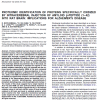
PROTEOMIC IDENTIFICATION OF PROTEINS SPECIFICALLY OXIDIZED BY INTRACEREBRAL INJECTION OF AMYLOID -PEPTIDE (1–42) INTO RAT BRAIN: IMPLICATIONS FOR ALZHEIMER’S DISEASE |
Neuroscience. 2021年01月 Kimball BD,Poon HF, et al. |
The results further suggest that Abeta(1-42)-induced oxidative stress in rat brain mirrors some of those proteins oxidized in AD brain and leads to oxidized proteins, which when inserted into their respective biochemical pathways yields insight into brain dysfunction that can lead to neurodegeneration in AD. |
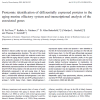
Proteomic identification of differentially expressed proteins in the aging murine olfactory system and transcriptional analysis of the associated genes |
J Neurochem. 2021年01月 Poon HF, et al. |
The results are discussed in relation to the decrement in olfactory sensitivity with aging. |
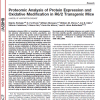
Proteomic Analysis of Protein Expression and Oxidative Modification in R6/2 Transgenic Mice |
Mol Cell Proteomics. 2021年01月 Perluigi M, Poon HF, et al. |
our results for the first time identify specific oxidatively modified proteins that potentially contribute to the pathogenesis of Huntington disease. |
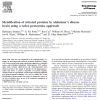
Identification of nitrated proteins in Alzheimer’s disease brain using a redox proteomics approach |
Neurobiol Dis. 2021年01月 Sultana R, Poon HF, et al. |
Our results are discussed in context of the role of oxidative stress as one of the important mechanisms of neurodegeneration in AD. |
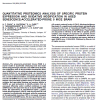
QUANTITATIVE PROTEOMICS ANALYSIS OF SPECIFIC PROTEIN EXPRESSION AND OXIDATIVE MODIFICATION IN AGED SENESCENCE-ACCELERATED-PRONE 8 MICE BRAIN |
Neuroscience. 2021年01月 Poon HF, et al. |
These findings are discussed in reference to the effect of specific protein oxidation and changes of expression on potential mechanisms of abnormal alterations in metabolism and neurochemicals, as well as to the learning and memory deficits in aged SAMP8 mice. |
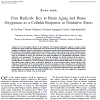
Free Radicals: Key to Brain Aging and Heme Oxygenase as a Cellular Response to Oxidative Stress |
J Gerontol A Biol Sci Med Sci. 2021年01月 Poon HF, et al. |
Therefore, this review supports the proposition that free radicals are, indeed, a key to brain aging. |